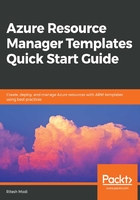
Conventions used
There are a number of text conventions used throughout this book.
CodeInText: Indicates code words in text, database table names, folder names, filenames, file extensions, pathnames, dummy URLs, user input, and Twitter handles. Here is an example: "This function allows utilization of the value stored in parameter for any resource configuration. parameters can be referenced from the variables, resources, and outputs sections of the same template."
A block of code is set as follows:
"parameters": {
"storageAccountName": {
"type" : "string"
}
}
When we wish to draw your attention to a particular part of a code block, the relevant lines or items are set in bold:
"[variables('multiLocation').location[copyIndex()].resourceGroupName]",
"properties": {
"mode": "Incremental",
"templateLink": {
"uri": "[variables('templateRefAppPlanTemplateUri')]",
"contentVersion": "1.0.0.0"
},
Any command-line input or output is written as follows:
Install-Module cmdlet
Bold: Indicates a new term, an important word, or words that you see on screen. For example, words in menus or dialog boxes appear in the text like this. Here is an example: "Provide a Name and Location in the New Project dialog box and click on OK."